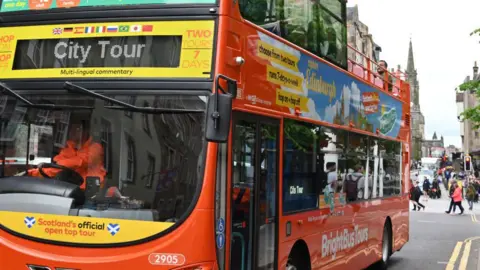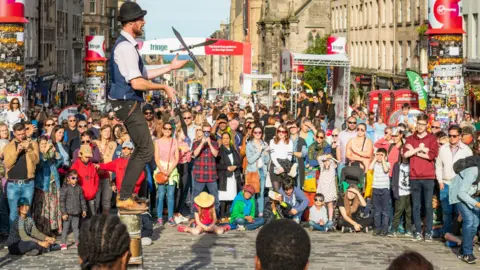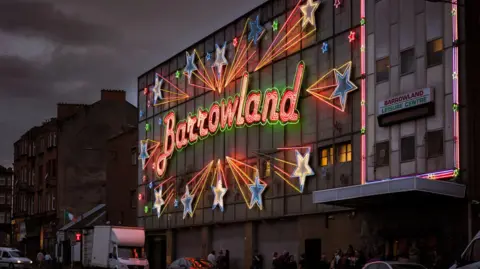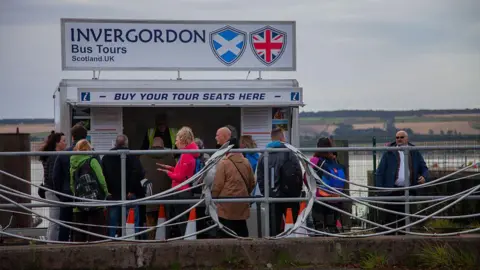Nichola RutherfordBBC Scotland
 Getty Images
Getty ImagesEdinburgh will become the first place in Scotland to charge visitors a “tourist tax” on top of the cost of their accommodation from next summer.
From this week, anyone booking a hotel, B&B, or holiday let for stays in the capital after 24 July 2026 will be subject to the 5% levy.
Other popular destinations look likely to follow suit.
BBC Scotland News examines which parts of Scotland plan to implement the charge? And which areas have ruled it out?
How will the tourist tax work in Edinburgh?
 Getty Images
Getty ImagesIf you have already booked and paid for a stay in Edinburgh next summer, you will not have to pay the visitor levy.
But from 1 October, visitors looking for an overnight stay in the capital will need to fork out an extra 5% on top of their hotel bill.
It will apply to stays after 24 July 2026 but it will only be charged on the first five nights of a visitor’s stay.
The council must spend the money it earns via the tourist tariff on facilities and services used by business and leisure visitors.
Ronald Little, general manager of the Holyrood Marriott hotel, hopes to see the benefits of the extra cash on the streets of Edinburgh.
“After a really busy summer the city can look a bit grubby and that’s just because we don’t have the money to keep it to a good standard,” he said.
“I think if we want it to continue to be a premium destination we need to make sure that visitors look at it and this is the amazing city that we know it is.”
Which part of Scotland will introduce the tourist tax next?
 Getty Images
Getty ImagesAberdeen and Glasgow have also agreed to introduce a visitor levy, while several councils – including Orkney and Shetland – have rejected the idea.
Use the map below to see other local authorities’ positions on the charge.
Like Edinburgh, Glasgow plans to introduce a 5% charge on overnight stays.
It will cost visitors an average of £4.83 per night after it comes into force in January 2027.
Glasgow City Council said they hoped it would raise £16m a year to spend on infrastructure improvements and events.
Visitors to Aberdeen can expect to pay a 7% levy once the charge is introduced in April 2027 – at the earliest.
The works out as an extra £4.90 a night as the average hotel room costs about £70.
Aberdeen City Council estimates it will generate up to £6.8m a year for infrastructure projects.
A Scottish government spokesperson said: “The Visitor Levy (Scotland) Act gives councils the power to introduce a visitor levy in their area, if they think it is right and after they have consulted their local businesses, communities and tourism organisations.”
Why have some councils rejected tourist tax plans?
 Getty Images
Getty ImagesScotland’s island councils – Shetland, Orkney and Comhairle nan Eilean Siar – have either rejected or paused tourist tax plans.
They would rather the Scottish government permitted the option of a “point of entry” levy which would be charged at ports and airports.
It would mean cruise ship passengers – an estimated 1.2 million visited Scotland last year – would have to pay the charge.
Under the current Visitor Levy (Scotland) Act, they would not be charged – and neither would people in campervans parked up on the road side.
The Scottish government consulted on a potential cruise ship levy earlier this year.
A government spokesperson said the results were being analysed and a report would be published in “due course”.
Destination Orkney said an Edinburgh-style levy was not suitable for rural or island settings.
It found that businesses also have concerns that it would be difficult to administer and add to their workload.
But its chairman Martin Fleet said he believed visitors would be happy to voluntarily put a “fiver in the pot” if they could see the funds were being spent wisely.
“If you can demonstrate the value… and it’s not going into a big black hole plugging a deficit, that’s what people want,” he said.
 Getty Images
Getty ImagesWho is exempt from paying the tourist tax?
Tourists and people staying in Edinburgh for work will have to pay the tax.
This includes people from Scotland and the rest of the UK.
It will apply to people staying in hotels, hostels, guest houses, B&Bs, self-catering accommodation, camp sites and caravan parks.
Visitors staying in a vehicle or on board a vessel, such a canal boat which mainly stays in one place, will also have to pay the charge.
People who do not have a permanent or safe home will be exempt – such as homeless people, victims of domestic abuse, refugees and asylum seekers.

